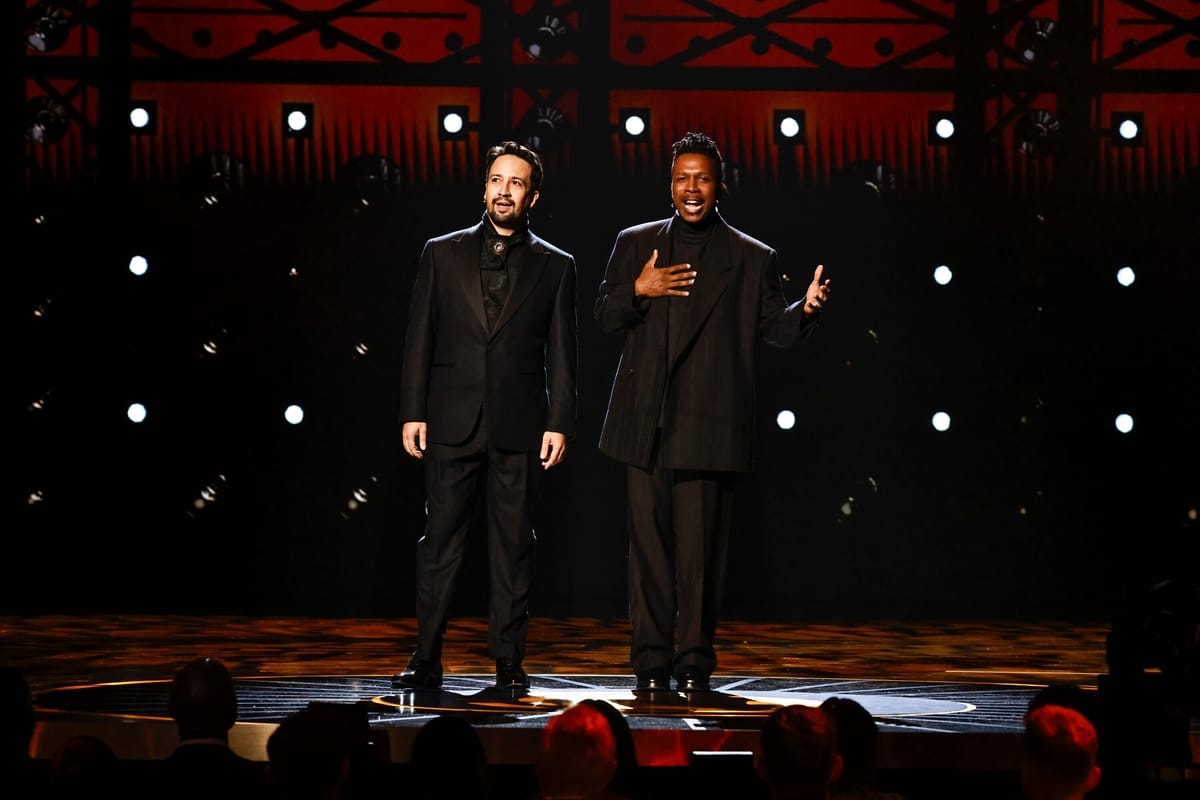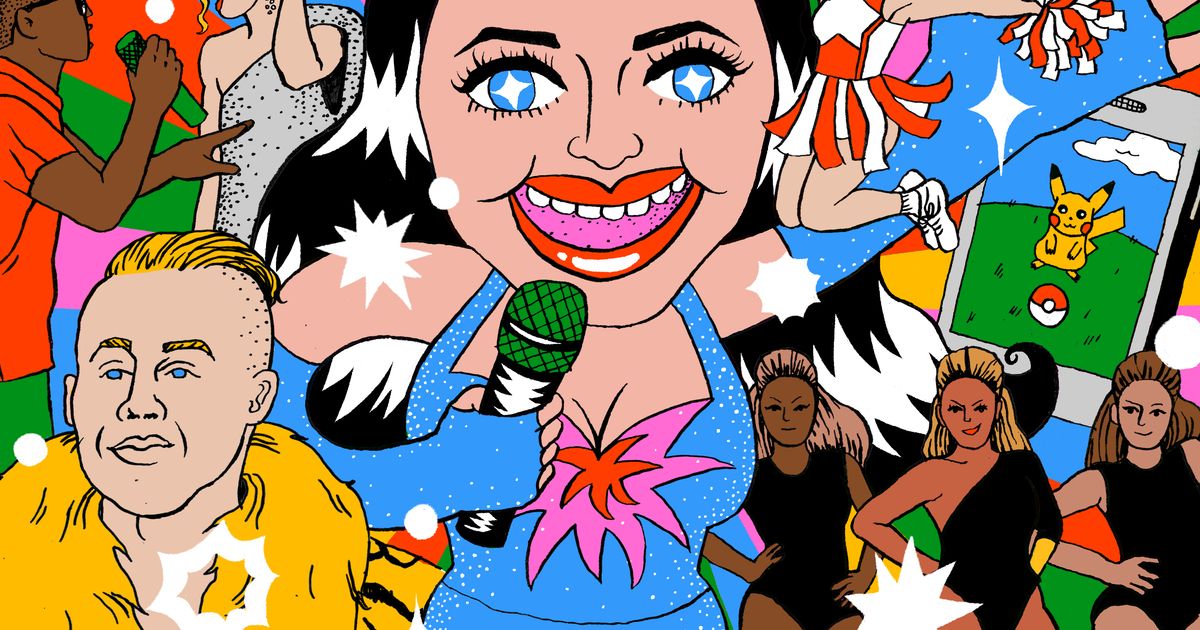Why is Hamilton mostly remembered for the things it's not?
The musical, now 10 years old, seems forever defined by the political moment in which it debuted.

The ongoing 10th anniversary of the mega-successful Alexander Hamilton bio-musical Hamilton – which premiered off-Broadway on February 17, 2015 and on Broadway on August 6, 2015 – has been a curiously muted affair. Members of the show's original cast have popped up here and there all year long, with the whole crew getting together for a performance at this year's Tony Awards. Leslie Odom, Jr., who won a Tony for originating the role of Aaron Burr, will return to that role from Tuesday through November 26. Composer/lyricist/star Lin-Manuel Miranda has done more media appearances than usual. And the Disney+ proshoot of the original cast will be in theaters this upcoming weekend.
But when you consider just how impossible to escape the show was in the roughly 18 months from the Broadway debut to Donald Trump's inauguration in January 2017, the fact that we're not constantly inundated with Hamil-ten stuff feels a little odd. Some of that is simply that the show became wildly over-exposed during that year and a half, so we're still working off the hangover from that. (How many Game of Thrones retrospectives did you see in 2011?) Some of it is that Broadway's cultural footprint, which was already anemic in the early Hamilton years, has basically collapsed in the wake of the Covid-19 theater closures, save for the diehard fans. And some of it is that the wider marketplace for "hey, it's the anniversary of this thing!" pop culture reflections has somewhat evaporated as the cultural media has shrunk considerably.
It would be hard, however, to argue that the way the show became so heavily associated with the late Obama era hasn't played a role in its legacy. For the most part, if you talk to people who are really, really into musical theater, Hamilton remains a touchstone work of the 21st century, one that is worth studying, celebrating, and critiquing. If you talk to people who primarily know the show from those 18 months, then they might be able to hum a couple of songs or tell you some salient facts about star/composer/lyricist Lin-Manuel Miranda. But if you are someone who spends a lot of time online – congratulations, you are reading this newsletter, so you probably are – then Hamilton surely rests alongside various other 2010s cultural objects like Girls and Parks and Recreation, which remain good in a pure vacuum but which have also become irrevocably associated with the second Obama term, the fallout from the 2016 presidential election, and the last gasp of an era of progressive politics that ultimately shattered. (Vulture dubbed this "Obamacore" last year.)

To be clear, none of this association is the fault of these artworks! Hamilton became closely associated with the Obama White House, yes, but almost in the manner of a hip youth pastor trying to use his familiarity with pop culture to get his students really into Jesus. The art remains the art, and in the case of all three examples listed above, said art is thornier, more interesting, and just plain better than its current reputation.
Still: To listen to Hamilton now is to be forcibly cast back into that time, perhaps in a way that can be mildly traumatizing. To some extent, a lot of Democratic infighting in the years since Hamilton's height has been an endless relitigating of the 2016 Democratic primary, when Hillary Clinton edged out Bernie Sanders for the nomination, in a fashion that left embittered feelings on both sides. To that end, Hamilton has often been read less as its own thing and more as a series of feelings projected onto it by those who had understandably soured on the Democratic mainstream in the spring of 2016.
Become a paid subscriber: You'll get access to two weekly newsletters only paid subscribers receive, the Episodes Discord, and almost a decade of archives. Sign up for as little as $5/month below!
Thus, far too many leftist critiques of Hamilton take the form of finding the fanbase cringe. If we set those aside, however, we'll find a fairly salient critique of the musical on its political merits, which goes thusly: Hamilton's foremost success as a political text – casting the Founding Fathers with all actors of color – also obscures the very real problems with the Founding Fathers in the name of lively political agitprop predominantly aimed at flattering 21st century sensibilities. It ends up making the whole project insufficiently revolutionary for a project that is literally about the American Revolution. After all, the musical barely mentions slavery, a deep, dark mark on the legacy of the Founding Fathers and an enormous point of contention among them. It earnestly celebrates a man who was basically a banker, rather than pursuing anything like a class analysis. It is a classic American rags-to-riches story, right down to the opening lines marveling at the title character's rise from orphan to political kingpin, but the rags-to-riches story necessarily obscures so much about the ways that capitalism grinds all of us beneath its bootheel in favor of simple fun.
(Sidebar: There's also a very salient leftist critique of Hamilton as a product of Broadway, a cultural entity that exists almost entirely to entertain those in the upper economic percentiles, but I'm not sure that critique is best expressed via Hamilton specifically than via all of Broadway in general.)
I love Hamilton, and over the years, I've come to largely agree with all of the above. When I ask myself why none of these qualms bother me, it comes down to something the above critique conveniently elides: Hamilton's primary – or even secondary or tertiary – aim is not to be political agitprop. It is intentionally using the trappings of agitprop to tell a story about a single man, whose fascinating life allows a window into a fraught period in human history. And if the musical actually attempted to be a show that allowed for all of the nuance suggested by the above critique, it would probably be a far worse show.
As an example of what I mean, take a look at Shaina Taub's Suffs, a musical about the fight to win women the right to vote in the U.S. that is probably the most obvious case of a Broadway musical attempting to catch the Hamilton wave of making learning American history fun. Suffs predominantly focuses on the white women in the suffragist movement, but it makes just enough room for the Black women in that movement to eventually depict how their concerns specific to American racism were completely abandoned in the midst of the fight. It's a bitter pill at the center of one of the suffragist movement's ultimate success.
Between the period when Suffs debuted off-Broadway in 2022 and on Broadway in 2024, it tweaked its script to draw the Black characters further into the spotlight and make sure audiences didn't go home thinking this fight was a simple victory of progress over those who would thwart it. However, a thrilling, feel-good musical about the women who won the right to vote and a darker, more cynical show about all of the women who weren't represented in that fight are always going to struggle to exist within the same project. In a miniseries or novel, there would surely be the narrative real estate to do such a thing, but in even a three-hour musical, doing both creates a degree of complexity that just about anybody would struggle to wrestle into control. I admired how much the Broadway Suffs worked to complicate my view of its protagonists, but it also meant I left the show appreciating what it was trying to do more than loving the end result.
In Hamilton, Miranda was fairly ruthless at cutting out anything that got in the way of his core character study, to the degree that it was his choice to largely eschew the arguments over slavery that so divided Founding Fathers. Does that make the show worse as history? Yes. Does it make it better as a narrative? Also, yes. For the most part, in fact, the leftist critiques of Hamilton largely avoid the show's second act, which is mostly about how Alexander Hamilton sucks, how his inability to simply chill out meant he destroyed so many things he held dear, and how he could not ever leave well enough alone. If the show were going out of its way to also point out that, like, Thomas Jefferson sucked – which he did – it would create a story so diffuse that any of its power would be diluted. For better or worse, the show's outwardly neoliberal trappings are necessary for the story to work at all, and too often, critiques of the trappings avoid the things about the story that are undercutting or even subverting the trappings.
In many ways, the arguments around Hamilton were an early apex of pop culture arguments that had been building throughout the 2010s to that point, arguments that have continued to this day. As I wrote in 2023 about Barbenheimer:
At some point in the past decade, we became aware that all art is political – because it exists within the political realities of the society and artists who created it – but that led to what feels like an increased insistence that art's primary reason for existing is as a political object. This belief does a disservice to art and to politics. The predominant goal of politics is persuasion, and while it must make room for nuance, it usually does so in the name of sanding that nuance off of a more strident position. To me, art is at its best when it begins from a position of nuance and keeps going. There is plenty of art that has as its first goal political persuasion, but this art is rarely the kind that lasts beyond its specific moment. Art that speaks to us across time usually has a broader aim, a goal to explore the nuances of human behavior in ways that go beyond the didactic.
Thus, I have always been sympathetic to leftist critiques of Hamilton while feeling as though they're missing the forest for the trees. Hating any work of art for any reason is fine, especially if you are predominantly consuming art as a proxy for your politics. But to say that Hamilton is synonymous with the political movement that latched onto it is to miss most of what's most interesting about the show. All these years later, it feels easier to agree that Hamilton's politics didn't go far enough than to agree that the show was very good and worth seeing. And as someone who spends a lot of time thinking about art and politics, I'm not sure I love that conclusion. Maybe it's worth remembering that there were very good reasons Hamilton felt so revolutionary when it debuted – it's just that few of them had anything to do with politics.
Three Things to Read
Here are some things?? To read??? (Well, one of them is an internet radio station, but you could read the song titles!)
- I deeply appreciate The Transfeminine Review for publishing this translation of an interview from a Mexican trans zine, which highlights the global nature of the fight for trans rights and trans liberation.
- Loved this Katie Heindl piece on how the modern conversation around sports and sports media is grossly underserving a moment when the WNBA is both better known than ever and subject of some terrifying misogynist backlash.
- When I'm just hanging out, not doing much, I often pop on Vintage Obscura Radio, which comes up with all kinds of random tracks from all over the world. Never a dull moment!
A Good Song
The free edition of Episodes, which (usually) covers classic TV and film, is published every other Wednesday, and the subscriber-supported edition of Episodes, which covers more recent stuff, is published every Friday. Paid subscribers also have access to the weekly Monday Rundown. This newsletter is written by Emily St. James, Libby Hill, and others. If you have suggested topics, please reply to the email version of this newsletter or comment (if you are a paid subscriber).





